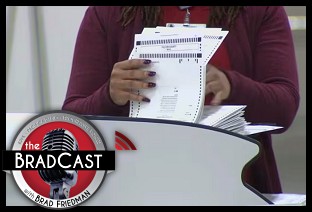Guest Blogged by John Gideon
The BRAD BLOG has received a copy of the 'Complaint For Declaratory and Injunctive Relief', as filed earlier this week in Allegheny County, PA, by several disabled voters. The complete suit is now available here [WORD format].
As the suit itself is some 43 pages, we will distill it for you a bit, and cover the most notable aspects. The BRAD BLOG is just thoughtful that way.
As we reported on Wednesday, the complaint was filed against the Pennsylvania Secretary of State, other state and county officials, an Assistant Attorney General for the Civil Rights Division of the US Dept. of Justice, and Attorney General Alberto Gonzales.
The complaint asserts that the state certified Electronic Voting Machines made by Elections Systems & Software, Inc. (ES&S) are not accessible by voters with disabilities --- contrary to the requirements of the Help America Vote Act (HAVA) of 2002 and the Americans With Disabilities Act (ADA). Nonetheless, Allegheny County has selected their machines for use in upcoming elections. That, after previously hoping to go with Diebold, and then with Sequoia Voting Systems, until finally settling on ES&S after the first two choices fell apart either due to the politics of the companies involved and/or due to the discovery their Electronic Voting Systems were found to be hackable.
As mentioned, the choice to not use Diebold in Allegheny occurred, in no small part, because of the company's known hard-right partisan leanings. The lawsuit, however, points out the irony of finally choosing to go with ES&S --- considering their own dubious partisan background...
ES&S is an Omaha, Nebraska-based company which declines to fully reveal its ownership. According to published reports, about half of ES&S is owned by the Omaha World-Herald Company, the publisher of Omaha's daily newspaper, and another quarter of the company is owned by the McCarthy Group, an Omaha investment fund. The other owners, if any, are unknown, as is the full ownership of the McCarthy Group.
Republican U.S. Senator Chuck Hagel was the head of ES&S's predecessor, American Information Systems (AIS) until 1995, when he resigned to run for Senate. Senator Hagel continues to own a multi-million dollar interest in the McCarthy Group, Inc., of which ES&S is a subsidiary. In the past, Senator Hagel � widely considered a likely Republican presidential contender in 2008 --- has failed to fully disclose his financial ties to ES&S.
Michael McCarthy, CEO of the McCarthy Group, Inc. acted as Senator Hagel's campaign manager in both the 1996 and 2002 elections.
In 2006, McCarthy contributed money to the Sandhills PAC, which contributed money to Rick Santorum, the Senate Republican incumbent for Pennsylvania, who will be on the May 16 primary ballot in Allegheny County. According to published reports, in the past three election cycles, Michael McCarthy and his wife contributed substantial sums of money to Republican candidates and nothing to Democrats, while in the last five and half years, executives and employees of the McCarthy Group, Inc. contributed almost six times as much money to the GOP as to Democratic candidates.
Strong partisan ties, combined with a lack of transparency regarding the ownership of this company, will lead to public questions about the integrity of the voting process, which in turn will diminish voters' confidence in that process. Such voter concerns are well founded.
In the section directed towards the strong-arm tactics of the U.S. DoJ and the Attorney General, Count VI of the complaint alleges that, for some reason, Pennsylvania has been singled out specifically and threatened for HAVA non-compliance in a way that no other state has been. Singling out PA in this way, the suit alleges, is a violation of their Fifth Amendment Constitutional right to "due process of law"...
This threat, combined with the threat to seek recoupment of monies paid to Pennsylvania under HAVA, has prompted the State and County Defendants to rush to acquire and implement new voting technologies without regard for the security, reliability, and accessibility of the new machines, and without regard for the chaos which is certain to result on Election Day if the machines are placed in use.
Despite these threats, the Department of Justice has taken a sharply different approach in a similar matter in the adjoining state of New York, by recognizing that the Department does not "expect the impossible" when it comes to matters affecting the fundamental right to vote. In New York, the Department of Justice has made clear that it would not pursue legal action if circumstances did not permit the State to adopt new machines prior to the first federal election of 2006.
Defendants' actions ... treating the Commonwealth of Pennsylvania, the plaintiffs, and Allegheny County unequally on the basis of the same relevant facts ... violate plaintiffs' right to due process of law, as protected by the Fifth Amendment to the U.S. Constitution.
This unequal system serves no compelling interest, lacks any substantial relationship to any important federal interest, and is not rationally related to any legitimate federal interest.
Defendants' illegal actions may only be cured by declaratory and injunctive relief, requiring Defendants Kim and Gonzales to treat Pennsylvania and Allegheny County (and the voters of Allegheny County) equally to the voters of other states, and to refrain from litigation or the threat of litigation if Allegheny County does not adopt new voting systems for the May 16 primary or thereafter.
In an apparent response to some of the allegations in the suit, which has a list of plaintiffs that includes two wheelchair-bound voters, Pittsburgh Post-Gazette reported yesterday that the county and ES&S have made some concessions for disabled voters by announcing changes to the hardware being sent to Allegheny...just five weeks before the Primary...
In addition, the county unveiled plans to equip one of the two machines at each precinct with "sip and puff" technology, which allows disabled voters with restricted mobility to cast their ballots without assistance.
Also, each of the county's electronic voting machines will be modified to produce voter-verified paper audit trails. Both upgrades, however, require state certification.
We already know that ES&S is having a lot of problem printing paper ballots and getting them to their customers all across the country in time to support elections as they have contractually agreed. Why Allegheny County would believe they'd receive any different treatment from the company --- once the ink dries on the contracts --- is almost beyond understanding.
It is also puzzling how ES&S can promise to install a binary switch on one machine in each precinct. This switch is required to allow voters with mobility disabilities to vote independently. The switch allows aides such as "sip-puff", joystick, and gel packs to be used by that part of the voting community. ES&S has not installed that technology on any of their DRE (touch-screen) voting machines so far; why suddenly now? Has this lawsuit finally convinced them that they had better think about the voters with disabilities after all? That is, after all, the gimmick that was included in HAVA --- at no small expense to the Electronic Voting Machine Vendors --- to help force these horrific machines into every polling place around the country. And why would Allegheny County regard this major change in ES&S voting machines, which have already failed as-is all around the country, to be a small, easy, safe change to effect to these machines just weeks before Primary Elections in the state are to begin?
The inclusion of a binary switch is a major modification to a voting system. It will require testing of hardware, firmware and software by federally qualified Independent Test Authorities (ITAs) and federal qualification. This all takes time. Certainly there will be nothing available in time for the primaries.
As Harry Litman, one of the attorneys involved in the lawsuit told the Post-Gazette, the last minute changes don't affect the basis of the lawsuit. "It sounds like this just adds one more patch to a patchwork decision," Linder said.
So what do the plaintiffs in the case hope to accomplish? Here is the relief they are requesting from the courts in the case:
- Declaring that the iVotronic and M650 voting machines, as described above, fail to comply with ... 301 of HAVA;
- Declaring that the certification by the Secretary that the iVotronic and M650 were HAVA-compliant is null and void, and that these voting systems, as described above, do not in fact comply with HAVA;
- Preliminarily and permanently enjoining Defendants from purchasing or using iVotronic and M650 voting machines for use in any election for federal office in Allegheny County or elsewhere on May 16, 2006 or in the November general election;
- Preliminarily and permanently enjoining Defendants from depriving Plaintiffs of their federally-protected right that only HAVA-compliant electronic voting machines be used in the primary election of May 16, 2006 and in the November general election;
- Preliminarily and permanently enjoining the Secretary from interfering with the Board of Elections' use of the existing lever system until such time as the Board may purchase HAVA-compliant voting machines for use in Allegheny County;
- Requiring Defendants Kim and Gonzales to refrain from litigation or the threat of litigation if Allegheny County does not adopt new voting systems for the May 16 primary or thereafter;
- Declaring that, as to Defendants Kim and Gonzales, the use of existing lever machines in the May 16 primary provides no basis for litigation or the threat of litigation or efforts to seek recoupment of monies paid to Pennsylvania for the benefit of Allegheny County in connection with HAVA;
- Awarding plaintiffs' their reasonable attorneys' fees and expenses; and
- Such other and further relief as may be just and necessary.
As Litman told the Post-Gazette, "We're trying to force the county to slow down, rethink [the decision] and give Allegheny County a chance to pick a set of machines that can be used for the next 40 years."
A bit of sanity, we'd suggest, in a Democracy gone haywire in 2006 --- as the DoJ is playing politics for keeps, and the bulk of the mainstream media is simply looking the other way.
Said Litman, "We're going to have to live with these machines for a long time."
To which we might add, we're going to have to live with the results reported by these machines, questionable and otherwise, along with the blow to confidence in our Electoral Democracy, for an equally long time. If not longer.
Brad Friedman contributed to this report.


 It's About Elections and the Windmills of His Mind: 'BradCast' 1/29/26
It's About Elections and the Windmills of His Mind: 'BradCast' 1/29/26 'Green News Report' 1/29/26
'Green News Report' 1/29/26
 Govt Shutdown Over ICE Funding Near Certain This Weekend: 'BradCast' 1/28/26
Govt Shutdown Over ICE Funding Near Certain This Weekend: 'BradCast' 1/28/26 Trump Blinks, Bovino Out, MN Op Falters but Continues as Midterm Accountability Looms: 'BradCast' 1/27/26
Trump Blinks, Bovino Out, MN Op Falters but Continues as Midterm Accountability Looms: 'BradCast' 1/27/26 'Green News Report' 1/27/26
'Green News Report' 1/27/26 The ICE Murder of ICU Nurse Alex Pretti and the Heroes of Minneapolis: 'BradCast' 1/26/26
The ICE Murder of ICU Nurse Alex Pretti and the Heroes of Minneapolis: 'BradCast' 1/26/26  The BRAD BLOG: 22 Years and Still Counting
The BRAD BLOG: 22 Years and Still Counting Sunday 'Worth a Thousand Words' Toons
Sunday 'Worth a Thousand Words' Toons Mr. Smith Testifies (Publicly) in Washington: 'BradCast' 1/22/26
Mr. Smith Testifies (Publicly) in Washington: 'BradCast' 1/22/26 'Green News Report' 1/22/26
'Green News Report' 1/22/26 World Turning Against Self-Destructing U.S. Under Trump: 'BradCast' 1/21/26
World Turning Against Self-Destructing U.S. Under Trump: 'BradCast' 1/21/26 Trump Admin Waste, Fraud, Abuse on Voting, at DOJ, by DOGE: 'BradCast' 1/20/26
Trump Admin Waste, Fraud, Abuse on Voting, at DOJ, by DOGE: 'BradCast' 1/20/26 'Green News Report' 1/20/26
'Green News Report' 1/20/26 Sunday 'Domestic Terrorist' Toons
Sunday 'Domestic Terrorist' Toons 'Green News Report' 1/15/26
'Green News Report' 1/15/26 'A Cornered Rat': Trump Terrorizes Minneapolis, Menaces NATO, World: 'BradCast' 1/15/26
'A Cornered Rat': Trump Terrorizes Minneapolis, Menaces NATO, World: 'BradCast' 1/15/26 'Not Close to Over': Mad King Trump in Venezuela (& Beyond): 'BradCast' 1/14
'Not Close to Over': Mad King Trump in Venezuela (& Beyond): 'BradCast' 1/14 Things Getting Weirder as Trump Keeps Losing: 'BradCast' 1/13/26
Things Getting Weirder as Trump Keeps Losing: 'BradCast' 1/13/26 After ICE Murder in MN, Local Cops Disown Fed Policing Practices: 'BradCast' 1/12/26
After ICE Murder in MN, Local Cops Disown Fed Policing Practices: 'BradCast' 1/12/26 Trump to Congress, Climate, U.N., Rule of Law: DROP DEAD - 'BradCast' 1/8/26
Trump to Congress, Climate, U.N., Rule of Law: DROP DEAD - 'BradCast' 1/8/26 'Nonsense': Trumpers Claim 315k Fraudulent GA Votes in 2020: 'BradCast' 1/7/26
'Nonsense': Trumpers Claim 315k Fraudulent GA Votes in 2020: 'BradCast' 1/7/26 Jack Smith Testimony on Trump J6 Crimes, DOJ Weaponization: 'BradCast' 1/6/26
Jack Smith Testimony on Trump J6 Crimes, DOJ Weaponization: 'BradCast' 1/6/26 Trump War on Venez. is About Ego, Power, 'Alien Enemies Act': 'BradCast' 1/5/26
Trump War on Venez. is About Ego, Power, 'Alien Enemies Act': 'BradCast' 1/5/26
 VA GOP VOTER REG FRAUDSTER OFF HOOK
VA GOP VOTER REG FRAUDSTER OFF HOOK Criminal GOP Voter Registration Fraud Probe Expanding in VA
Criminal GOP Voter Registration Fraud Probe Expanding in VA DOJ PROBE SOUGHT AFTER VA ARREST
DOJ PROBE SOUGHT AFTER VA ARREST Arrest in VA: GOP Voter Reg Scandal Widens
Arrest in VA: GOP Voter Reg Scandal Widens ALL TOGETHER: ROVE, SPROUL, KOCHS, RNC
ALL TOGETHER: ROVE, SPROUL, KOCHS, RNC LATimes: RNC's 'Fired' Sproul Working for Repubs in 'as Many as 30 States'
LATimes: RNC's 'Fired' Sproul Working for Repubs in 'as Many as 30 States' 'Fired' Sproul Group 'Cloned', Still Working for Republicans in At Least 10 States
'Fired' Sproul Group 'Cloned', Still Working for Republicans in At Least 10 States FINALLY: FOX ON GOP REG FRAUD SCANDAL
FINALLY: FOX ON GOP REG FRAUD SCANDAL COLORADO FOLLOWS FLORIDA WITH GOP CRIMINAL INVESTIGATION
COLORADO FOLLOWS FLORIDA WITH GOP CRIMINAL INVESTIGATION CRIMINAL PROBE LAUNCHED INTO GOP VOTER REGISTRATION FRAUD SCANDAL IN FL
CRIMINAL PROBE LAUNCHED INTO GOP VOTER REGISTRATION FRAUD SCANDAL IN FL Brad Breaks PA Photo ID & GOP Registration Fraud Scandal News on Hartmann TV
Brad Breaks PA Photo ID & GOP Registration Fraud Scandal News on Hartmann TV  CAUGHT ON TAPE: COORDINATED NATIONWIDE GOP VOTER REG SCAM
CAUGHT ON TAPE: COORDINATED NATIONWIDE GOP VOTER REG SCAM CRIMINAL ELECTION FRAUD COMPLAINT FILED AGAINST GOP 'FRAUD' FIRM
CRIMINAL ELECTION FRAUD COMPLAINT FILED AGAINST GOP 'FRAUD' FIRM RICK SCOTT GETS ROLLED IN GOP REGISTRATION FRAUD SCANDAL
RICK SCOTT GETS ROLLED IN GOP REGISTRATION FRAUD SCANDAL VIDEO: Brad Breaks GOP Reg Fraud Scandal on Hartmann TV
VIDEO: Brad Breaks GOP Reg Fraud Scandal on Hartmann TV RNC FIRES NATIONAL VOTER REGISTRATION FIRM FOR FRAUD
RNC FIRES NATIONAL VOTER REGISTRATION FIRM FOR FRAUD EXCLUSIVE: Intvw w/ FL Official Who First Discovered GOP Reg Fraud
EXCLUSIVE: Intvw w/ FL Official Who First Discovered GOP Reg Fraud GOP REGISTRATION FRAUD FOUND IN FL
GOP REGISTRATION FRAUD FOUND IN FL

































